Iran Grapples With Severe Nurse Shortage

Iran continues to grapple with a growing shortage of nurses in a failing health system with as many as 35 patients per nurse at any one time.

Iran continues to grapple with a growing shortage of nurses in a failing health system with as many as 35 patients per nurse at any one time.
An investigation conducted by the Donya-ye Eqtesad daily has revealed the ongoing crisis engulfing Iran in the aftermath of the COVID-19 pandemic. As waves of the virus subsided, many nurses were left unemployed. The shortage of both doctors and nurses risks the lives of patients in need of critical care.
In August, Abbas Ebadi, the Deputy Minister of Nursing at the Ministry of Health, reported a dire need for approximately 100,000 new nurses to mitigate the growing crisis. To put the current nurse shortage in perspective, Iran's total nursing workforce comprises 215,000 nurses, according to Ebadi.
Global healthcare guidelines suggest a nurse-to-patient ratio of approximately 2.5 for optimal care. However, Iran has only 0.8 nurses available for each hospital bed. In some regions, this ratio further plummets to 0.6, significantly deviating from international standards.
The nurse shortage is further compounded by factors such as retirements, resignations, and emigration, contributing to a dwindling nursing workforce. Shockingly, an average of five to six nurses leave the country daily, and on a monthly basis, approximately 100 to 150 nurses emigrate from Iran, further exacerbating the nurse shortage.
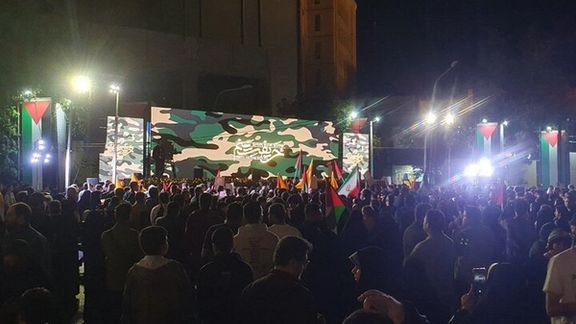
The Iranian regime launched a multi-platform campaign to recruit fighters for the Hamas war against Israel while Iranians are branding it a propaganda stunt.
The media campaign started simultaneously on several of the regime’s mouthpieces, such as websites affiliated with the Revolutionary Guards and the state broadcaster. A chyron message was aired during broadcasts calling on viewers to sign up and declare their readiness to be sent to Palestine to fight Israel.
A short message was also sent to Iranians asking them to express their readiness via SMS. The regime also launched a website with the name of al-Aqsa Storm, the codename Hamas used for its surprise air, sea and ground offensive into Israel that killed over 1,400 Israeli civilians and hundreds of soldiers.
The Iran-backed Islamist group, designated a terrorist group by the US and several other countries, also took more than 220 people as hostages.
Although most Iranians are familiar with such regime gimmicks and are certain that their participation in a media stunt would not qualify them to go to war, about six million people registered in the campaign, titled “You are dealing with us.” The Persian phrase is literally translated as “I am your rival.”
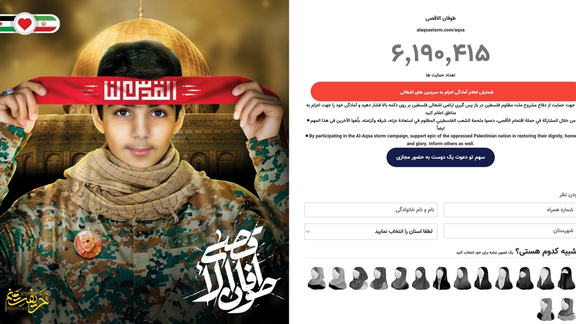
The regime also organized and sponsored several events and rallies in numerous Iranian cities to garner support for its publicity campaign.
The campaign has been a source of ridicule on social media, where Iranians make fun of the regime loyalists who say they are eager to go to war despite being sure that is not possible. A large number of people wish that the volunteers would actually go to the war so that Iran is rid of such regime sympathizers.
Even if travel to Gaza was possible, Iranians cannot legally go there because to get to Gaza they have to go through Israel, which is not an option for anyone with an Iranian passport. And even if the Islamic Republic opts to engage in the conflict, the IRGC members and members of its extraterritorial wing Quds Force are the natural candidates and not ordinary civilians.
“We knew you wouldn't go," political commentator Ali-Hossein Ghazizadeh said on X (formerly twitter), claiming that these regime supporters who use their connections with regime insiders to fill their pockets would not leave the safety of their homes, let alone go to the war. “We wish for all of you to become martyrs,” he addressed the Hamas supporters, referring to a recent interview by the country’s culture minister, Mohammad-Mehdi Esmaili, who told the reporter to be ready to die in Gaza.
Asghar Sepehri, the brother of Iranian political prisoner Fatemeh Sepehri, has quipped that those who complain that they cannot go to Gaza because the borders are closed can ask Iran’s ruler Ali Khamenei to extend the war to Lebanon. “Ask the Supreme Leader to have Hezbollah of Lebanon also enter the war with Israel. Your deployment to Lebanon won't be a problem,” he said on X.
The spillover of the conflict has already reached the West Bank with limited artillery fire exchange between Israel and Hezbollah. Iranian authorities keep threatening that if the war extends to other fronts, they will engage in the war. Israel says if Hezbollah enters the war in a more significant and direct way than it already is, Israel will attack Iran.
Another social media post that resonated with Iranians and was widely retweeted pointed out that Basijis – a term used for IRGC’s volunteer forces – will never go to war because they are not used to fight with armed people, referring to the crackdown on protests that rocked Iran after the death in custody of a young woman last year.
“They're not used to facing an armed enemy, and they're afraid. Basijis only go where their opponents are 16-year-old girls and unarmed people who can be attacked and killed with guns and batons,” said an X user who posts under the name Moji.
A group of Iranians also held a gathering at Tehran’s Mehrabad Airport, claiming that they are at the airport and ready to go to war. All Iranians know that Mehrabad Airport is only used for domestic flights, drawing large social media ridicule that these so-called Basijis are not even ready to take the longer trip to Imam Khomeini Airport, from where international flights depart.
Such false expressions of support for Hamas are not limited to Iran. Recently a video went viral of a Turkish reporter who asked people on streets if they were ready to go to the war. The interviewees say they are ready but immediately another man comes and asks about information and addresses of the people who expressed readiness. The short clip is widely circulated because none of those who claimed support for Hamas are actually willing to give their contact information to make it official.
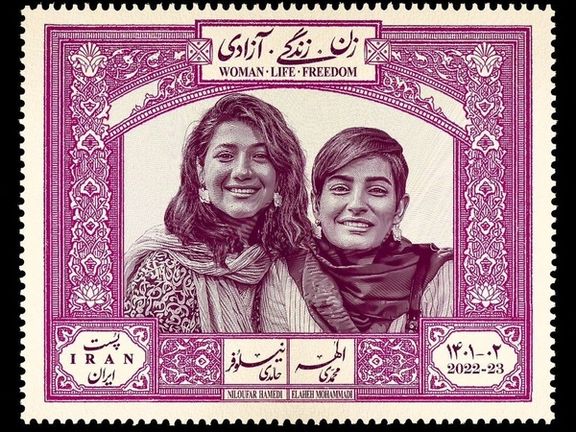
The sentencing of two journalists for reporting Mahsa Amini's death in custody has sparked outrage among many Iranians, who deem the charges groundless and unjust.
“I wish the judiciary would explain, in simple terms, how Elaheh Mohammadi and Niloofar Hamedi ‘collaborated with the hostile government of the United States’ so that others would learn a lesson and not commit the same crimes. Ditto, what was the crime for which they ‘assembled and colluded’?” reformist politician Sadegh Zibakalam asked in a tweet.
On Sunday, the judiciary declared the sentences of 12 and 13 years for Mohammadi and Hamedi, respectively, handed down by a Revolutionary Court under the jurisdiction of Judge Abolghasem Salavati, who has become notorious for imposing death penalties on individuals accused of opposing the regime.
The two journalists who were “provisionally” detained for over a year before their sentencing have denied all the charges brought against them.
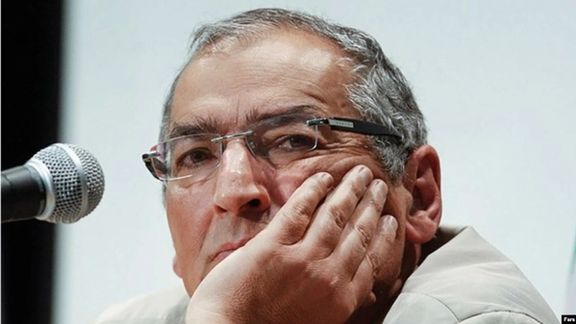
Mohammadi, a reporter with the reformist Ham-Mihan, and Hamedi who reported for the reformist Shargh daily, were found guilty of “collaboration with the hostile government of the United States”, “assembly and collusion to act against the country’s national security”, and “propaganda against the regime” by the notorious judge Abolghasem Salavati.
They have also been banned from membership in political parties and groups as well as any media or social media activity for two years as an additional punishment.
Many, including veteran journalist Mashallah Shamsolvaezin and attorney-at-law Babak Paknia say the seven-year sentence for “collaboration” with the United States is not justifiable on various grounds including lack of evidence.
The court alleged that the two journalists participated in training courses overseas that were organized by the US State Department through “intermediary organizations” to prepare them for “hybrid wars and soft overthrow” of the regime.
The Judiciary listed several foreign-based organizations, including United 4 Iran, the Small Media Foundation, and Iran Academia, without providing any evidence of their connection to the US government
Speaking to BBC’s Persian Service, Shamsolvaezin who is the chairman of Iranians journalists Association, also argued that the Islamic Republic has not officially designated the United States as a “hostile government” because in 2018 it used the Iran-US Friendship Treaty of 1956 as proof in a case brought against Washington at the International Court of Justice, accusing the US of violating the treaty by freezing Iranian assets abroad.
The reason for the unfair and unjustifiable sentences in “staged trials” against Niloofar Hamedi and Elaheh Mohammadi is “instilling fear among journalists”, one of the tweets in support of the two journalists said. ‘Because fear is one of the biggest weapons of totalitarian governments against opposition.”
The judiciary's official news agency, Mizan Online, released a "documentary" on Sunday. It featured numerous excerpts of conversations of Mohammadi and Hamedi with different people, along with recorded interviews with Mahsa Amini's family members, in an attempt to establish a conspiracy to overthrow the regime. The content of the film appears to have been primarily obtained through the surveillance of the journalists' mobile phones.
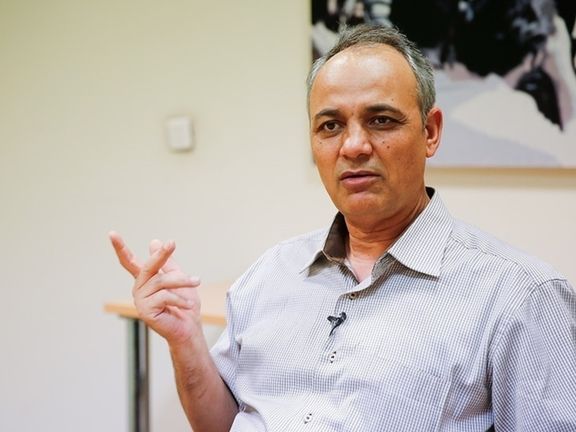
Regarding the "documentary," journalist and political commentator Ahmad Zeydabadi remarked that the evidence used to incriminate the two journalists implied that, in the authorities' view, journalists' efforts to investigate and shed light on events like Amini's death could only be seen as "collaboration with the US to overthrow the system."
“Therefore, all Iranians, who are unhappy and want the circumstances to improve or change, are considered as criminals and must be prosecuted and sentenced to prison,” he added. “Do [those who produce such films] expect all media and journalists to be completely at the service of the government and its policies?”
Others have pointed out that Mohsen Shekari, a protester, was sentenced to death for burning a trash bin, a man who beheaded his wife was sentenced to seven and half years in prison, and the top defendant in the case of the downing of a Ukrainian passenger plane in 2020, which killed all 176 onboard was only sentenced to a three-year term.
“Two journalists who reported Mahsa Amini’s death have been sentenced for reporting the incident. Saleh Nikbakht, the attorney of Mahsa Amini’s family, was sentenced to prison, too. Do you know of anyone who was put on trial for their role in Mahsa Amini’s death?” Saman Movahedirad, journalist, tweeted after the announcement of the sentencing.
Reporters Without Borders (RSF) on Sunday said it was “appalled and alarmed by the outrageous 12 and 13-year prison sentences” dealt to Mohammadi and Hamedi. The sentencing “makes a mockery of the concept of justice,” said Jonathan Dagher, the head of RSF’s Middle East desk.
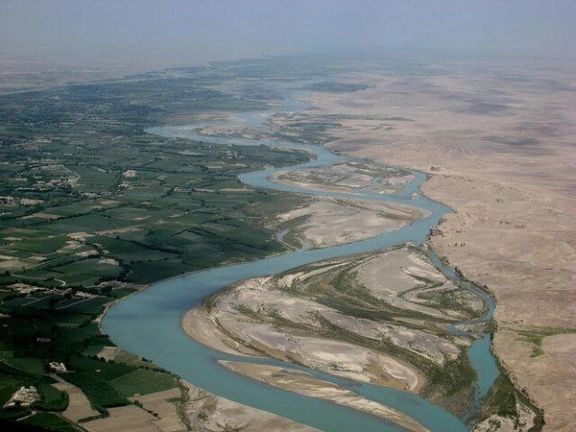
After a months-long water dispute, Iran's regime claims the Taliban have still not given Iran’s share of water from the Hirmand River.
The Tasnim News Agency, affiliated with the Islamic Revolutionary Guard Corps, quoted the spokesperson for Iran's water industry on Tuesday, stating that “despite the new water year, no share of the Hirmand River water has been allocated to Iran.”
The river, known as Helmand in Afghanistan, plays a pivotal role in sustaining both Afghanistan and Iran, serving as a critical source for agriculture and drinking water. Yet, it has remained a persistent cause of tension between the two countries.
Over time, Iran has accused Afghanistan of impeding the river's water flow through the construction of dams, an allegation vehemently denied by Afghan authorities. The Iranian government and environmentalists contend that building dams on the river exacerbates issues in Iran's eastern regions, particularly in the water-scarce Sistan-Baluchestan province.
The issue of Iran obtaining its share of the water has been a long-standing dispute between the Islamic Republic and the Afghan government. However, these disagreements intensified with the resurgence of the Taliban in Afghanistan, leading to recent disputes between the two countries' authorities.
In August, the CEO of Iran's Water Resources Management Company, mentioned the technical team's trip to Afghanistan to negotiate water rights. He alleged that the Taliban in Afghanistan did not grant permission for the Iranian technical team to inspect the Kajaki Dam reservoir.
While many activists and even some media outlets have criticized the Islamic Republic for what they perceive as shortcomings in addressing this issue, the water crisis in Sistan and Baluchestan continues.
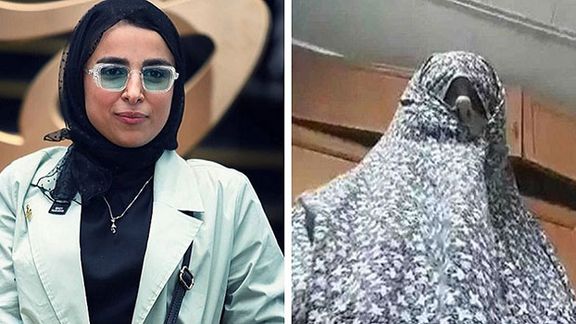
Iranian comedian Zeinab Mousavi, known by her stage name Empress Kuzcooo and famous for her anti-regime stance, has reportedly been arrested.
It is suspected that Mousavi, a 32-year-old computer software graduate, has been charged with sacrilege since humor, even in the Islamic Republic, is not officially a crime. The Mizan News Agency, affiliated with the Iranian judiciary, announced the arrest of "an active lady in the virtual space who had insulted sacred values by producing content and publishing humorous videos."
The news of her arrest was announced on Monday. Empress Kuzcooo, a reference to the protagonist in Disney's 2000 animation Emperor's New Groove, is celebrated for her sharp humor and fearless criticism of clerics and politicians.
She has gained fame for breaking taboos by incorporating explicit sexual references in her stand-up routines. Operating from her hometown of Qom, known for being Iran's largest Shia seminary city, Mousavi earns her living through advertisements on her social media accounts, particularly on Twitter and Telegram.
In a recent video, Mousavi donned a Batman mask and satirized the Islamic Republic's propaganda regarding 'martyrdom' in Gaza, a move that might have triggered her arrest amid an Iran-backed war waged by its proxy Hamas against the regime's archenemy, Israel, broke out on October 7.
This is not the first time Mousavi has faced legal troubles for her activities. In October 2022, she was detained after participating in protests following the death of Mahsa Amini. A month later, reports emerged that she had been sentenced to two years in prison. Later, it was announced that she had been granted a pardon by the leader of the Islamic Republic.
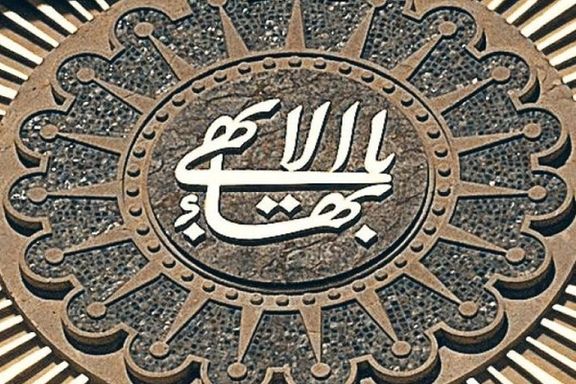
Agents of Iran’s ministry of intelligence have arrested 10 Baha'i women in the city of Esfahan (Isfahan) on Tuesday.
The detainees were apprehended at home following raids conducted by intelligence forces. They were transferred to an undisclosed location.
Additionally, during the searches of their residences, the agents confiscated personal belongings from the detainees and their families.
There have also been reports suggesting that intelligence agents have extended their operations by raiding the homes of numerous other Baha'i citizens in Esfahan, with the purpose of detaining them.
So far, no official information has been provided regarding the reasons behind the arrests or the specific charges brought against the arrested citizens.
The latest wave of arrests follows a backdrop of nationwide protests triggered by the murder of Mahsa Amini. The incident has ignited increased pressure on the Baha'i community from the regime of the Islamic Republic.
Members of the minority Baha'i faith face significant challenges in Iran, with the 1979 constitution officially recognizing only Islam, Christianity, Judaism, and Zoroastrianism. Baha'is are not afforded the same rights and protection.
Supreme Leader Ali Khamenei has previously referred to the Baha'i faith as a cult and, in 2018, issued a religious fatwa prohibiting contact, including business dealings, with Baha'i followers.
Iran is home to an estimated 300,000 Baha'is, who have consistently reported systemic violations of their rights, including harassment, forced displacement from their homes and businesses, and discrimination in areas such as government employment and higher education.